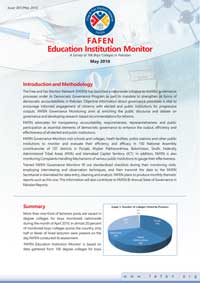PESHAWAR, May 28, 2010: Lack of personnel and facilities to serve the primary health care needs of women is among the issues of greatest concern, reveals FAFEN’s inaugural Health Institution Monitor for April 2010 released in Peshawar on May 28, 2010.
The Health Institution Monitor and other such thematic reports are meant to present to relevant stakeholders a consolidated and current snapshot of the state of governance in public institutions in order to inspire public dialogue and as a contribution towards targeted interventions and reforms. However, these reports are based on non-probability sampling, and their findings should not be considered national or provincial generalizations.
FAFEN Governance Monitors visited 110 Basic Health Units across Pakistan during April 2010 – 41 BHUs in 28 districts of Punjab, 28 BHUs in 22 districts of Khyber Pakhtunkhwa, eight BHUs in as many districts of Balochistan, 30 BHUs in 20 districts of Sindh, two BHUs in as many Tribal Agencies, and one BHU in the ICT.
Around one-fifth of BHUs monitored across Pakistan do not have female staff to attend female patients, including two-thirds of BHUs in Balochistan. Almost one-fourth of monitored BHUs do not have personnel to offer family planning counseling or other services, almost 40 percent do not have a maternity kit, and almost half do not have a labor room. Geographic disparities are striking across the country, especially between Punjab (with the most personnel and facilities to serve women) and Balochistan (with the least).
Most of the Basic Health Units (BHUs) monitored by FAFEN across Pakistan during April 2010 are employing more than the sanctioned number of paramedic staff (who are all male), but are short on nurses (who are predominantly female). A similar difference is documented in the appointment of male and female doctors, based on the information gathered from the BHUs monitored. While 2 percent of the sanctioned posts for male doctors are vacant, 13 percent of posts for female doctors have yet to be filled.
As many as 88 percent of the 110 Basic Health Units monitored across Pakistan are housed in proper buildings. Region-wise analysis suggests that more than 20 percent of the BHUs monitored in Khyber Pakhtunkhwa are not housed in a proper building, while the percentage for Punjab is 14.6 percent.
One-third of all BHUs monitored either do not have latrines or have latrines without running water. The issue is most acute in Balochistan where almost two-thirds of the monitored facilities do not have sanitation facilities for patients. Similar conditions exist in Khyber Pakhtunkhwa, where 57.1 percent of BHUs monitored do not have popper sanitation facilities for patients. As many as 30 percent of BHUs in Sindh and 26.8 percent in Punjab face the same issue.
Almost half of the BHUs visited nationwide do not have arrangements for clean drinking water for patients. More than half (57.1 percent) of BHUs in Khyber Pakhtunkhwa do have drinking water arrangements for patients, as do 50 percent in Balochistan, 46.7 percent in Sindh and 41.5 percent in Punjab.
One-fifth of all monitored BHUs do not have proper waiting rooms for visiting patents. Almost 43 percent of BHUs monitored in Khyber Pakhtunkhwa do not have proper waiting spaces for patients, and the same is true for 25 percent in Balochistan, 50 percent in FATA, 13.3 percent in Sindh and 7.3 percent in Punjab.
Most of the BHUs visited by FAFEN Governance Monitors during April 2010 lacked essential equipment and services to cater to primary health-care needs. As many as 16 percent BHUs visited do not offer free-of-cost medicines to visiting patients, with wide geographic disparities around the country. In addition, 23.6 percent of pharmacies/dispensaries at BHUs were out of medicines when FAFEN monitors visited them in April 2010. One-third of the BHUs visited do not have a sterilizer. Almost 22 percent of all BHUs visited do not have a syringe cutter, raising the possibility of reuse of used syringes – a practice that compromises government’s resolve to contain the spread of communicable diseases such as hepatitis, HIV, etc.
More than half (56.9 percent) of visited BHUs across the country do not have staff and a specialized ward to treat the patients with problems of emergency nature. No FATA BHU has such facilities. Around 79 percent BHUs visited in Khyber Pakhtunkhwa, 75 percent in Balochistan, 60 percent in Sindh and 35 percent in Punjab have no special arrangements to address medical emergencies.
About FAFEN:
FAFEN is a network of 30 civil society organizations working to foster democratic accountabilities in Pakistan. It is governed by Trust for Democratic Education and Accountability.


